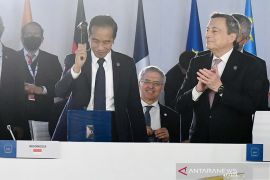So later, most of our economic growth will not come from debt, but more from the private sector, in line with the coming of foreign capital to IndonesiaJakarta (ANTARA) - The government is determined to build a sustainable economy that will transform economic growth policies through investments and ensure that development does not come from debt, Finance Minister Sri Mulyani Indrawati said. "So later, most of our economic growth will not come from debt, but more from the private sector, in line with the coming of foreign capital to Indonesia," Sri Mulyani said at the 2019 FT-AIIB Summit on the topic Delivering Indonesia's Infrastructure Vision 2019-2024 in Jakarta, Tuesday.
The transformation of the policy was initiated by improving and maintaining the investment climate, so that it could continue to drive the economy, bearing in mind the double digit growth required in this sector, Sri Mulyani said.
"It used to be double digit at 11 to 12 percent, but since the financial crisis our investment growth has been under double digits," she said.
Related news: Indonesia's economic growth in 2020 to reach 4.8 percent: Indef
A number of regulations that were keeping people back from investing in Indonesia were abolished and replaced with the Omnibus Law to bring in investments, he explained.
"Through the improvement of the investment climate, we hope to provide space for many investors to come to Indonesia, both domestic and foreign, to develop the economy," Sri Mulyani said.
The government will also improve the balance of payments as the domestic economy grows, while the current account deficit (CAD) condition will also increase due to the deficit in oil and gas imports.
She hoped that investment in the energy sector, including oil and gas, would help the balance of payments to continue to grow and at the same time reduce the deficit.
Indonesia had many types of investments in the energy sector, especially investments related to renewable energy, Sri Mulyani said.
Meanwhile, the Central Statistics Agency (BPS) noted that in the third quarter of 2019, investment only grew 4.21 percent (y-o-y) or slowed compared to the same period last year which was 6.29 percent.
Related news: Indonesia's economy needs 7% growth for Vision of 2045: official
This also happened to economic growth which only reached 5.02 percent in the third quarter of 2019 compared to the same period last year when it grew 5.17 percent.
Indonesia's foreign debt (ULN) rose 10.2 percent (y-o-y) to US$395.6 billion in the third quarter of this year or equivalent to Rp5.607 trillion, assuming an exchange rate of Rp14.174 per US dollar, according to BI Friday, November 15.
The foreign debt was made up of government and central bank debt of $197.1 billion and private debt of $198.5 billion.
"Indonesia's foreign debt growth of 10.2 percent (y-o-y), was relatively stable compared to the growth in the previous quarter which was influenced by the increased rise in government external debt amid slowing private external debt," BI said.
Related news: Global crisis weighed heavy on Indonesia's economic growth: BI
Translator: Astrid Faidlatul , Azis Kurmal
Editor: Rahmad Nasution
Copyright © ANTARA 2019












